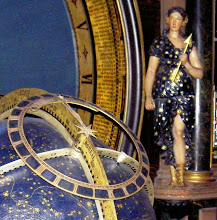
Now Maths A-Level almost certainly isn't your cup of tea, but many moons ago it happened to be mine. However, that is not what today's musings are about.
Young Lunchista was sitting in the classroom one morning, while our teacher was taking us through the finer points of 'partials'. And for once, the said young Lunchista was completely at a loss to understand what on earth our teacher was talking about. Everybody else (six bright lads: we were a fairly small, rural school, where you could look out of the window and see the hills) was listening attentively, as the equations on the board got longer and longer, the assumptions got more and more abstract and Lunchista got more and more lost.
Finally I could stand it no longer, put my hand up and asked for an explanation of how the very first step had been arrived at. So all the algebra was dusted off the board, and the poor chap patiently took it from the top. Our Maths lessons were very civilised affairs: no-one got all sarky if you didn't understand stuff. 'Partials' appeared to be some kind of gradient (which is really just the slope of a line), except that each point could have more than one of them. I was still clueless. How could a point on a graph have more than one slope?
Rinse and repeat.
"I'm sorry sir, I don't get what the things actually are, that we're trying to calculate." Pause. Cue genius.
"Well, imagine you were out on those hills fellwalking. One of those partials is the gradient you would feel if you were walking towards the East, and the other is the gradient if you were going Northwards"
And after a very visible light-bulb moment on my part, the lesson carried on. What still puzzled me as we headed for lunch was that I was usually among the first in our class to get my head round new things in Maths, so why had I been so thick that morning? Unusually, the lads came and sat with me as I ate. "Can you explain what on earth all that was about in Maths? You seemed to understand it..." Cue second light-bulb moment. Jammy gits, they'd just sat there in class letting me ask all the awkward questions! So they all got the full, take-no-prisoners explanation of partials, with mashed spuds and gravy. Because I happen to believe that life is always better if people understand stuff.
That incident, quite apart from revealing the subtleties of partials, and indeed the patience and ingenuity of teachers, first put me on to the idea that people are perfectly capable of sitting there looking as if they know everything while in fact remaining totally clueless. Not only that, but there are times when they actually prefer this option to the alternative of admitting inexperience in order to gain more understanding. Even in a class, where you would think that admitting you haven't got your head round something at first pass wouldn't result in a catastrophic loss of cred.
So as our country, and most of the world with it, lurches into interesting economic times, take a look at our leaders at the G20 summit this week. Are they in fact just a larger version of the lads in Lunchista's maths class all those years ago, sitting hoping for some or other inspiration that will enable them to take the whole matter forward, hopefully to a happy conclusion for all of us? Are they just busking it? Will they, worse still, only bother to gain enough understanding to bail their own selves and their ilk out of the likely ensuing poverty, while not being wise or knowledgeable enough to lift the rest of us out as well?
Funnily enough, the full name for those mathematical descriptions of slope is 'partial derivatives'. The same word, and the same idea, behind the type of trading notorious for its contribution to the instability in the financial system.



